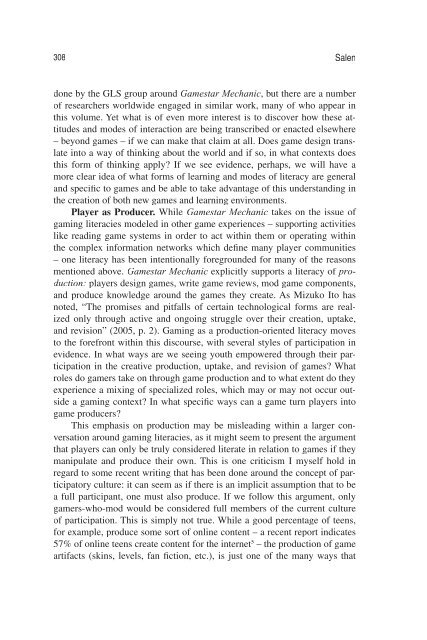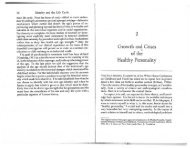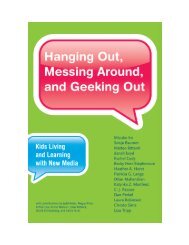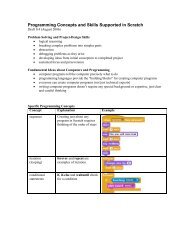Gaming Literacies: A Game Design Study in Action - MIT
Gaming Literacies: A Game Design Study in Action - MIT
Gaming Literacies: A Game Design Study in Action - MIT
You also want an ePaper? Increase the reach of your titles
YUMPU automatically turns print PDFs into web optimized ePapers that Google loves.
308 Salen<br />
done by the GLS group around <strong>Game</strong>star Mechanic, but there are a number<br />
of researchers worldwide engaged <strong>in</strong> similar work, many of who appear <strong>in</strong><br />
this volume. Yet what is of even more <strong>in</strong>terest is to discover how these attitudes<br />
and modes of <strong>in</strong>teraction are be<strong>in</strong>g transcribed or enacted elsewhere<br />
– beyond games – if we can make that claim at all. Does game design translate<br />
<strong>in</strong>to a way of th<strong>in</strong>k<strong>in</strong>g about the world and if so, <strong>in</strong> what contexts does<br />
this form of th<strong>in</strong>k<strong>in</strong>g apply If we see evidence, perhaps, we will have a<br />
more clear idea of what forms of learn<strong>in</strong>g and modes of literacy are general<br />
and specific to games and be able to take advantage of this understand<strong>in</strong>g <strong>in</strong><br />
the creation of both new games and learn<strong>in</strong>g environments.<br />
Player as Producer. While <strong>Game</strong>star Mechanic takes on the issue of<br />
gam<strong>in</strong>g literacies modeled <strong>in</strong> other game experiences – support<strong>in</strong>g activities<br />
like read<strong>in</strong>g game systems <strong>in</strong> order to act with<strong>in</strong> them or operat<strong>in</strong>g with<strong>in</strong><br />
the complex <strong>in</strong>formation networks which def<strong>in</strong>e many player communities<br />
– one literacy has been <strong>in</strong>tentionally foregrounded for many of the reasons<br />
mentioned above. <strong>Game</strong>star Mechanic explicitly supports a literacy of production:<br />
players design games, write game reviews, mod game components,<br />
and produce knowledge around the games they create. As Mizuko Ito has<br />
noted, “The promises and pitfalls of certa<strong>in</strong> technological forms are realized<br />
only through active and ongo<strong>in</strong>g struggle over their creation, uptake,<br />
and revision” (2005, p. 2). <strong>Gam<strong>in</strong>g</strong> as a production-oriented literacy moves<br />
to the forefront with<strong>in</strong> this discourse, with several styles of participation <strong>in</strong><br />
evidence. In what ways are we see<strong>in</strong>g youth empowered through their participation<br />
<strong>in</strong> the creative production, uptake, and revision of games What<br />
roles do gamers take on through game production and to what extent do they<br />
experience a mix<strong>in</strong>g of specialized roles, which may or may not occur outside<br />
a gam<strong>in</strong>g context In what specific ways can a game turn players <strong>in</strong>to<br />
game producers<br />
This emphasis on production may be mislead<strong>in</strong>g with<strong>in</strong> a larger conversation<br />
around gam<strong>in</strong>g literacies, as it might seem to present the argument<br />
that players can only be truly considered literate <strong>in</strong> relation to games if they<br />
manipulate and produce their own. This is one criticism I myself hold <strong>in</strong><br />
regard to some recent writ<strong>in</strong>g that has been done around the concept of participatory<br />
culture: it can seem as if there is an implicit assumption that to be<br />
a full participant, one must also produce. If we follow this argument, only<br />
gamers-who-mod would be considered full members of the current culture<br />
of participation. This is simply not true. While a good percentage of teens,<br />
for example, produce some sort of onl<strong>in</strong>e content – a recent report <strong>in</strong>dicates<br />
57% of onl<strong>in</strong>e teens create content for the <strong>in</strong>ternet 5 – the production of game<br />
artifacts (sk<strong>in</strong>s, levels, fan fiction, etc.), is just one of the many ways that







